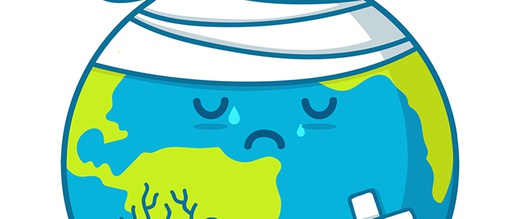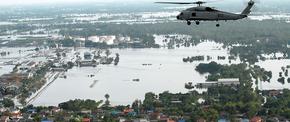The views expressed in our content reflect individual perspectives and do not represent the official views of the Baha'i Faith.
We know the world is warming.
Sure, climate change deniers still exist, but the evidence has become overwhelming. The vast majority of scientists accept anthropogenic or human-caused climate change. Atmospheric and oceanic temperatures show record increases over time. Epic, highly unusual weather events like powerful storms that produce unprecedented floods continue to occur at a more rapid frequency rate than ever before.
In mid-August of 2016, a storm that carried huge amounts of moisture stalled over southern Louisiana, and for days it rained Biblically. Weather stations recorded two feet of rain over a two-day timeframe, which caused apocalyptic flooding in Baton Rouge and across much of the state. The storm and its subsequent flood killed 13 people, inundated 55,000 homes and did $9 billion in damage—the worst natural disaster in the United States since 2012’s Superstorm Sandy hit the Northeast.
This catastrophic event wasn’t an anomaly or some thousand-year rarity—scientists clearly identified climate change as one of its major causes:
Using historical records of rainfall and computer models that simulate climate, the researchers, including several from the National Oceanic and Atmospheric Administration, found that global warming increased the chances of such intense rains in the region by at least 40 percent. – Henry Fountain, The New York Times, September 7, 2016.
With climate change now an accepted scientific fact, we all tend to focus on its known effects: disastrous storms, rising sea levels and hotter atmospheric temperatures. But one major effect of climate change has gone largely unnoticed outside the scientific community: the spread of new disease pandemics. Let’s examine a single example in the news recently: the Zika virus.
As the Earth continues to warm, its temperate zones have begun to shift, moving to higher latitudes as its tropical zones expand. The world’s oceans have absorbed much of the excess heat held in our atmosphere from fossil fuel combustion, and higher ocean temperatures contribute to hotter land masses. When that happens, rising heat affects all life forms. Cold water fish, for example, change their habitats as the water around them warms. Even insects migrate to newly-habitable zones. That’s why the Zika virus has moved:
Before last year, Zika outbreaks had appeared in sporadic small outbreaks near the equator in Africa, Southeast Asia, and the Pacific Islands. In May 2015, the Pan American Health Organization confirmed the first cases of Zika in Brazil; since then, the virus has spread rapidly throughout the Americas, including the first cases of Zika in the U.S. – Greg Mercer, Atlantic Monthly, February 24, 2016.
Zika, named after its origin point, a forest in Uganda, is a flavivirus, transmitted by mosquitoes when they bite humans:
In 2005, Paul Epstein of Harvard Medical School published an influential paper on climate change and human health, outlining mosquitoes’ sensitivity to temperature changes. “Warming of their environment—within their viable range—boosts their rates of reproduction and the number of blood meals they take, prolongs their breeding season, and shortens the maturation period for the microbes they disperse,” he wrote. In other words, they bite more, breed more, and spread more disease. – Ibid.
So the hotter it gets, the more we all risk getting diseases once confined to the tropics—especially virulent new diseases we’ve never encountered before, and which our immune systems can’t protect us from. As just one example, the World Health Organization (WHO) has estimated that a global rise in temperature of 2-3 degrees Celsius will expose another 7% of the world’s population to mosquito-borne malaria—which means several hundred million of us.
This fact has enormous implications for the future security of the world and the health of all its people. What can we do about it? Experts recommend two critical courses of action: 1.) conserving areas rich in wildlife diversity by reducing human activity and the burning of fossil fuels; and 2.) making immediate major new investments in our international public health infrastructure to focus on prevention, detection and rapid response.
In other words, we have to get ahead of zoonotic disease outbreaks, dealing with them long before they become disastrous pandemics—which means undertaking and constructing a massively well-funded, robust global public health effort on an international basis, right now. Millions will die if we fail. Since governments and international agencies don’t currently have enough excess fiscal capacity to fund this kind of herculean universal infrastructure, budget priorities must change.
This can only be done, Baha’is believe, if the world unites and abolishes war in order to free up the resources necessary to accomplish it.
That vision of a world at peace—the primary principle of the Baha’i teachings—will allow humanity to expend its energy on the things that really matter to all of us, and to our children and their children:
The enormous energy dissipated and wasted on war, whether economic or political, will be consecrated to such ends as will extend the range of human inventions and technical development, to the increase of the productivity of mankind, to the extermination of disease, to the extension of scientific research, to the raising of the standard of physical health, to the sharpening and refinement of the human brain, to the exploitation of the unused and unsuspected resources of the planet, to the prolongation of human life, and to the furtherance of any other agency that can stimulate the intellectual, the moral, and spiritual life of the entire human race. – Shoghi Effendi, The World Order of Baha’u’llah, p. 203.
Next: Building a New Global Health Security Agenda

















Comments
Sign in or create an account
Continue with Facebookor